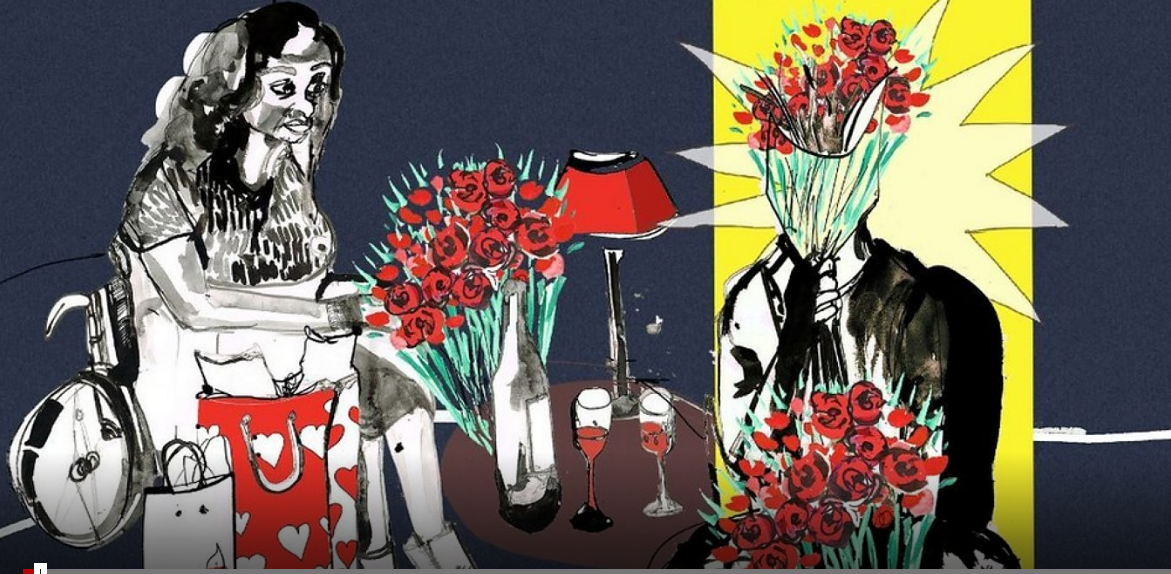
Ebere is a disabled woman from Nigeria, who came to the UK to seek asylum and safety from horrendous disability persecution, including rape and other violence. WinVisible supported Ebere when she was fighting her asylum case. She was referred to us by Women Against Rape, who are refugee and UK-born women, colleagues at the Crossroads Women’s Centre where we are based.
Listen to Ebere’s interview here: https://www.bbc.co.uk/sounds/play/p09gv28k
See below for written version — report by BBC.
WinVisible adds:
Anti-deportation groups at the Centre have supported and won the release of women asylum seekers in detention. Many women have visible and invisible disabilities including Post-Traumatic Stress Disorder, often resulting from the rape and other torture they fled from. Several were held in the notorious Yarl’s Wood detention centre in breach of Home Office guidelines which say that vulnerable people should not be detained. See Legal Action for Women’s self-help guide.
We know how racist and hostile the detention centres are. And large parts of the Yarl’s Wood detention centre were not accessible to disabled women. One wheelchair user couldn’t get to the canteen for food, all were denied medical treatment or counselling for mental distress – all were dependent on the other women there making sure they survived. In 2007, we supported a man wheelchair user with spinal injury who had been detained in Harmondsworht detention centre, who won a legal case against denial of medical treatment and lack of accessible facilities. The court ruled that the Disability Discrimination Act did apply in immigration detention. But conditions remain appalling.
In Ebere’s case, we wrote a support letter to the Home Office Asylum Screening Unit detailing the disability persecution which she fled from in Nigeria, the domestic violence and exploitation she had suffered in the UK, and saying she must not be put in detention. Ebere endured appalling racist treatment from the Home Office and immigration tribunal. They refused to recognise the persecution she had suffered, they said she could be sent back, and her case was refused many times. And she suffered rape, violence and disability abuse by a man she had met in the UK, including being locked in the house and deprived of her wheelchair. But when she went to a Women’s Aid refuge, the workers would not physically help her and white women residents moved away if she sat on the sofa. As a witness at criminal court, she was accused of reporting rape just to get the right to stay.
She was also left in very bad living conditions by the Home Office. When she was “dispersed” from London to Birmingham, the asylum hostel she was driven to was not accessible and she was taken elsewhere. She ended up left in a hotel room with no physical assistance, no medication and missing her medical treatments. WinVisible found her a community care solicitor to get her better accommodation and treatment. Support by campaigners helped her to win her right to stay, but it took many more years of struggle.
Write-up shared from BBC News and the Ouch disability podcast:
“When you are disabled and live with your abuser, you are scared to talk,” says Ebere, a disabled survivor who was abused for years. “Particularly if you are trapped with him at home, or reliant on his money or care.”
Ebere, not her real name, has faced abuse throughout her life.
Born in Nigeria, she contracted polio as a baby and became a wheelchair-user. Her parents considered her disabilities a “curse” and physically and mentally abused her.
“I was treated like nothing. I was beaten up and threatened, unlike my siblings, without disability, who were treated with respect.”
Aged seven, Ebere was sexually assaulted by a family member. But when she tried to report it “my parents told me they would kill me if I spoke about it”. She felt “defenceless”.
‘I thought he was a gentleman’
According to UNICEF, disabled children are four times more likely to experience abuse and three times more likely to experience sexual violence compared to their non-disabled peers.
Eventually, Ebere fled to the UK on a student visa to study social care. “I presumed that I’d escaped abuse forever because I had fled my family,” she says, but it wasn’t to be.
She soon met a man and started a relationship.
“I thought he was a gentleman, a prince charming. But he turned out to be a perpetrator and a gambler. He became controlling and started raping me.
“Experiencing abuse for the second time affected me so much,” she says. “No-one knows what is happening behind those walls. I didn’t want to live anymore.”
Ebere didn’t know how to escape until a friend put a small phone in her incontinence pad so her ex-partner wouldn’t find it. It enabled her to call the police, and her partner was arrested.
But once she was free, she found it difficult to find wheelchair-accessible accommodation. Many refuges had steps into the building or rooms and doorways could be too narrow for her wheelchair. She also struggled to find places which had the resources to support her mental health needs.
“I stayed in hostels, hotels and refuges, but I wasn’t happy. I didn’t feel like there was inclusivity,” she says.
‘I experienced hell’
Slowly, over five years, Ebere rebuilt her life and now has her own home.
“I tell my story because I experienced hell and I don’t want anyone to go through what I had to go through.”

1 thought on “Ebere’s story – surviving violence back home and in the UK”